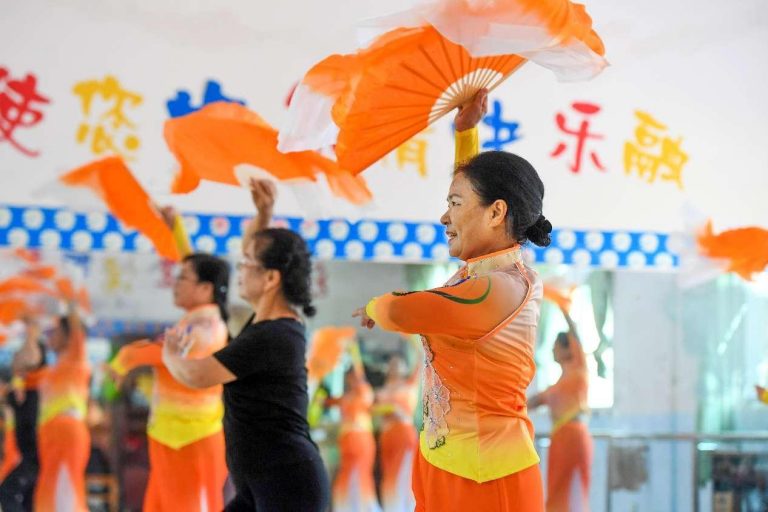
By Fan Jiayuan, Sun Longfei, Despite the chilly weather in early spring, swimming enthusiasts have already started jumping into the Yimin River in Hulunbuir, north China’s Inner Mongolia autonomous region. Among them, there are many elderly people.
According to a survey conducted by the Hulunbuir elderly sports association, over 70 percent of the citizens in the city aged 60 and above participate in sports activities regularly. There are over 600 indoor sports venues suitable for the elderly, and nearly 1,000 outdoor fitness locations available in the city.
In recent years, there has been an increasing awareness of health and a growing demand for sports products and services among the elderly population in China. At the same time, there has been a rise in the development of fitness facilities and equipment that are tailored for the elderly and incorporate smart technology. This has created new opportunities, generated new prospects, and unleashed new potential.
Liu Guifang, 71, lives in Qinhuangdao, north China’s Hebei province. He often plays tennis with his friends and has a passion for sports photography. He has even purchased professional equipment such as single-lens reflex cameras and computers to take photos of some sporting events.
Last year, after photographing the Cup of China ISU Grand Prix of Figure Skating which took place in Chongqing municipality, Liu took the opportunity to embark on a 20-day trip in Chongqing and Chengdu, capital of Sichuan province.
“Engaging in sports, watching games, and going on deep travels, my life after retirement is truly fulfilling,” Liu said.
As sports and fitness become increasingly popular among the elderly, the sports consumer market has shown significant growth. According to data from Tmall, an online shopping platform under Chinese e-commerce giant Alibaba, in the fourth quarter of 2023, the transaction volume of skiers in their fifties increased by 65 percent compared to the previous year, while that of skiers in their sixties increased by 131 percent.
In recent years, outdoor activities such as camping, hiking, and cycling have flourished, and some products that combine sports and cultural tourism have become popular among elderly consumers.
Ctrip, a Chinese online tourism service provider, has launched a travel product that combines mountain climbing and golf specifically designed for the elderly on its platform, and over 1,000 people have inquired and signed up since its launch.
“Nowadays, the elderly no longer settle for tourist attractions, and the inclusion of sports activities provides them with a richer experience,” said Fang Zexi, an industry analyst with Ctrip.
Meanwhile, sports events for the elderly are becoming increasingly diverse. According to Wen Wen, vice chairman of the Chinese Veterans’ Sports Association, many regions have seized the opportunity to launch high-quality tourism routes and products related to sports events, which have been well received by the elderly.
On Jan. 24 this year, an outdoor intelligent fitness center for the elderly, covering an area of about 500 square meters, was established in Zhongshan Park, Wuhan, central China’s Hubei province. In less than a week, it attracted thousands of users to come and experience it.
With the voice guidance of the intelligent devices, a senior citizen surnamed Zhang completed a physical fitness test and received a report. She said, “It suggested that when my heart rate exceeds 130, I should pay attention to my running speed. It even reminded me during the test.”
Zhang Jiahua, Chairman of Good Family, the developer of the equipment in the park, said that one important function of the elderly fitness products is to customize exercise programs for the elderly.
“Many elderly people find it difficult to control the intensity of their exercise. Digital and intelligent fitness equipment can provide timely advice and reminders. The long-term accumulation of exercise data helps users manage their health,” Zhang noted.
In addition to common elderly fitness activities such as walking, practicing Tai Chi, and square dancing, more and more elderly people are becoming interested in indoor fitness. Since 2021, the Shanghai Municipal Bureau of Sports and the Shanghai Municipal Civil Affairs Bureau have jointly launched an elderly sports program that has now built 120 sports centers for the elderly in 16 districts of Shanghai.
Wang Hailong, chairman of the board of the company executing the program, said that all fitness equipment has been adjusted to cater to the physical characteristics of the elderly. They also provide exercise interventions for chronic diseases and rehabilitation training.
“Recently, we have also developed and introduced elderly yoga courses, and the elderly have shown great enthusiasm for them,” Wang added.
In the sports industry, the renovation of fitness facilities for the elderly, the integration of sports and healthcare, and the organization of sports events for the elderly have become hot topics.
“The demand for sports among the elderly has always existed, and sports consumption is showing a trend towards diversification and specialization,” Wang told People’s Daily. With China entering an aging society, developing the “silver hair economy” and meeting the sports needs of the elderly will help them enjoy healthy and happy twilight years.










